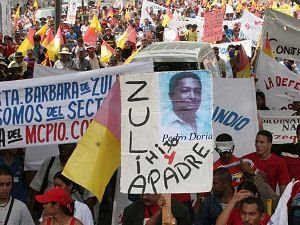 Two leaders, in similar positions, can deal with conflict in very different ways. This is true in every conflict, whether the stakeholders are highly educated university officials or uneducated peasants.
Two leaders, in similar positions, can deal with conflict in very different ways. This is true in every conflict, whether the stakeholders are highly educated university officials or uneducated peasants.The campesinos who live along the Carare River in the jungles of Colombia are ordinary people without academic degrees or training. Yet when they were ordered by a general in the army to take up weapons against the guerillas (i.e. to take one side against another), they refused to be forced against their will into a civil war and were determined to live in peace. Committed to nonviolence (their slogan: "We shall die before we kill!"), they beautifully articulated the power of an integral vision. Its principles included the following:
• Faced with silence and secrecy: do everything publicly.
• Faced with fear: be sincere and dialogue.
• Faced with violence: talk and negotiate with everyone.
• Faced with exclusion: find support in others.
To put their integral vision into action, the residents of this war-torn region formed the Association of Peasant Workers of Carare. For many years, they accomplished what others considered impossible. They created an organization that helped ordinary citizens protect themselves without aligning with either the guerillas or the army.'
Mark Gerzon, Leading Through Conflict: How Successful Leaders Transform Differences into Opportunities, Boston: Harvard Business School Press, 68.
Image: Campesinos marching for peace.

